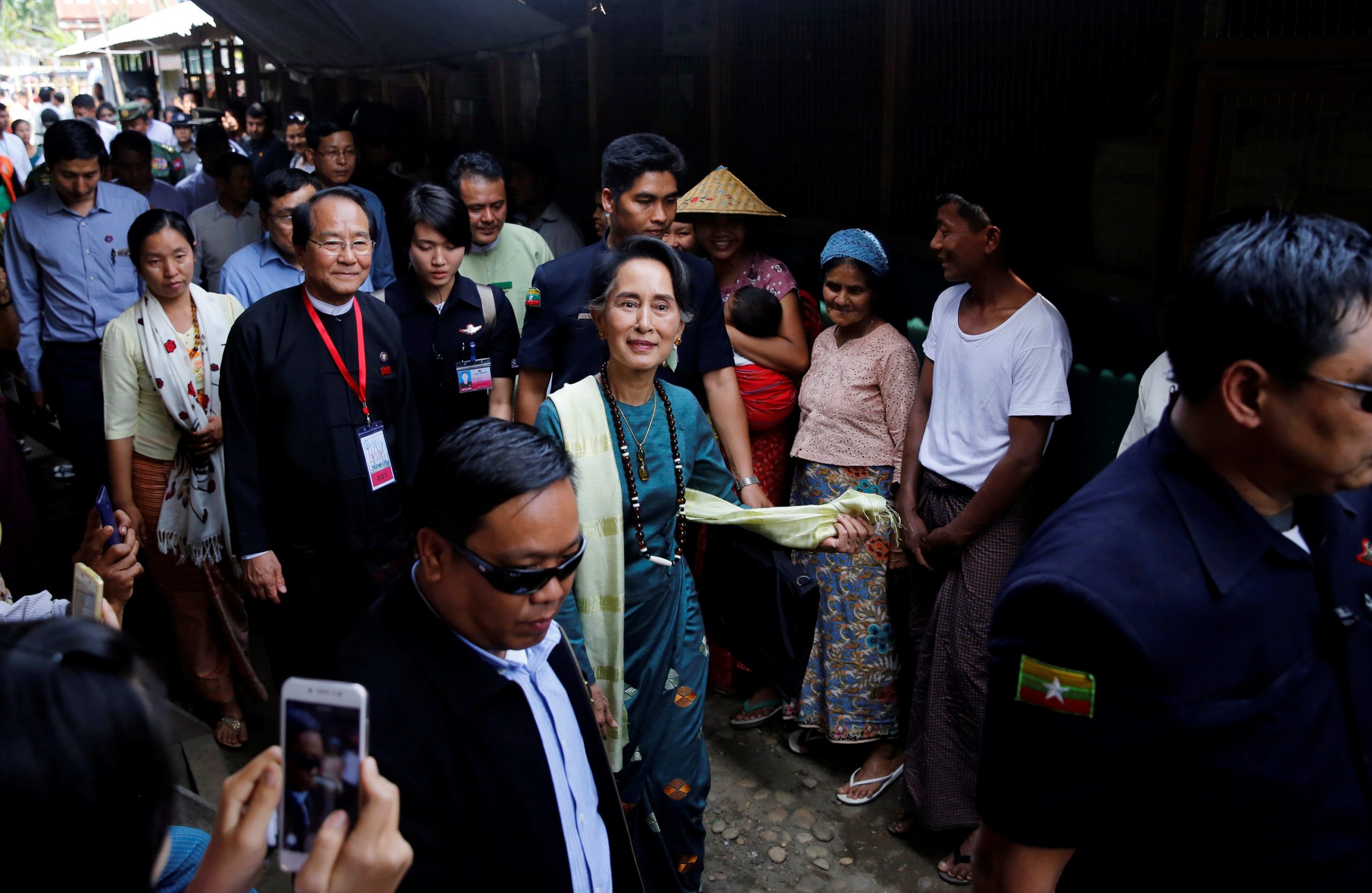During a brief trip to conflict-wracked Kachin State on Tuesday, State Counsellor Aung San Suu Kyi visited displacement camps and, in a lighter moment, posed for photos with a pair of nonagenarians who similarly smiled for the camera with Suu Kyi’s father more than a half-century ago.
Myitkyina-based civil society activist Kyaw Kyaw Oo said Suu Kyi met with displaced locals at shelters in Waingmaw Township’s Hkat Cho and Maina to ask about their situations. The internally displaced persons (IDPs) reportedly told the state counsellor about livelihood woes at the camps and expressed a desire to return to their home villages.
In response, Suu Kyi is said to have told the IDPs that they must also strive for self-sufficiency.
“Mainly, the [state counsellor] told them to not just rely on the government but also on themselves and try to stand on their own feet, and she also urged regional government officials to try and create job opportunities to tackle unemployment,” said Kyaw Kyaw Oo.
He said following her trip the Waingmaw displacement camps, the state counsellor visited a Buddhist monastery that runs an orphanage in Myitkyina. She also planned to visit a displacement camp in the state capital before heading back to Rangoon later in the day.
The state counsellor arrived in Myitkyina on a flight from Rangoon on Tuesday morning and met with more than 30 representatives from local CSOs, religious organisations and the Kachin Advisory Committee, which facilitates talks between the government and the Kachin Independence Army, the state’s predominant ethnic armed group.
Tang Gon, one of the meeting’s attendees and secretary of the anti-narcotics vigilante group Patjasan, said the situation of locals displaced by armed conflict, political issues and setbacks to ceasefire talks with the KIA were raised by representatives of his group.
“We discussed with the [state counsellor] regarding the issue of IDPs — an increase in the number of displaced locals and difficulties and obstructions in providing them humanitarian aid, and we stressed the need to immediately tackle these issues,” said Tang Gon.
“We also pointed out that the [Burmese military] offensive in the region must stop in order to make way for the peace effort.”
The Patjasan secretary said Suu Kyi, in response, reiterated her call to the KIA to sign the Nationwide Ceasefire Agreement (NCA) as a step toward joining her government’s high-level peace dialogue, known alternatively as the 21st Century Panglong Conference and Union Peace Conference.
“She repeated her call [for the KIA] to sign the NCA and join the peace conference. She also assured that there would be no disadvantage for the group in doing so and that she will personally help tackle any shortcomings if things turn out otherwise,” said Tang Gon.
“Whether to trust her or not, we have to make a judgement based on past experience — the promise in the [1947 Panglong] Agreement to build a federal Union has not yet been fulfilled after seven decades and now the government is again making that same promise while, at the same time, the [military] is waging offensives against ethnic armed groups,” he said.
“Moreover, the 2008 Constitution looks the opposite direction of the principle of a federal Union, so this verbal promise from the [state counsellor] is something we will have to consider cautiously.”
On his Facebook page on Tuesday, the KIA’s vice chief-of-staff, General Gun Maw, said he viewed the meeting between Suu Kyi and Kachin representatives in Myitkyina as “encouraging,” but disagreed with a remark by the state counsellor during one event suggesting that the KIA’s political wing had agreed to sign the NCA.
“The state counsellor stated that the Kachin Independence Organisation has agreed to sign the NCA, but in reality, we have only said that we are open to continue negotiations on terms and conditions in the accord and then will sign it when these terms and conditions are agreeable to us,” Gun Maw wrote.
[related]
“We have not yet agreed to sign the NCA and have also pointed out that the Panglong Agreement cannot be used as a fixed formula to resolve the [ethnic] issues as not every ethnic group signed the agreement in 1947.”
Upon arrival in Myitkyina, Suu Kyi was greeted by two elderly women who had appeared in a photo with her father, General Aung San, prior to his assassination in 1947.
Gong Hkaw Raw and Roi Nwang, both in their 90s, said they were delighted to meet with the state counsellor, who was greeted by large crowds on the campaign trail in Kachin State as a parliamentary candidate in 2015.
“I am happy and grateful that I got to meet with Daw Suu. I wish her good health,” said Gong Hkaw Raw.
Roi Nawng said, “I pray to God every day for the physical and mental well-being of Daw Suu.”
Reporting by Thin Thin Nwe and Naw Noreen



